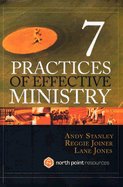 I grew up in
I grew up in What could have been done about this? How could a smooth transition have been made, easily enough. If
Thankfully, most churches don’t work this way. In “7 Practices of Effective Ministry”, three leaders from
There are two sections to the book. The first is written by Lane Jones & is a story of a fictional pastor who skips out on a church board meeting to attend a baseball game. But over the course of the game, he learns more about church ministry than sports. In the second section of the book, Reggie Joiner expounds the seven practices of
The first practice is to Clarify the Win. “Most churches do not have a reliable system for defining & measuring what success looks like at every level of the organization.” It is important to have measurable goals, a sense of what we are trying to accomplish. A baseball team is attempting to score runs; what counts as a “run” in your church? It might be x amount of baptisms, x percentage in small groups, x percentage of leaders developed. What are you working toward?
The second practice is Think Steps, Not Programs. “When you ‘think steps’ the primary goal is to help someone get to where they need to go.” So you want to score runs. You could hit a HR each at bat, but without BALCO, that’s not possible. We need to get the leadoff man on, have him steal second, hit him over to third & them drive him in. Measurable, manageable steps.
The third practice is Narrow the Focus. “If you really want to make a lasting impact, then you need to eliminate what you do well for the sake of what you can potentially do best.” No offense, but I hate the Stl Cardinals. (big rivilry with the Cubs). However, the 85 Cardinals are a good illustration of this practice. They were a team built for speed & small ball. Busch Stadium is no your proto-typical power hitters park. They had one good power hitter (Jack Clark). So they played to their strength….speed. Vince Coleman, Willie McGee, They would get on & steal bases, be sacrificed over, play small ball like the best of them. They didn’t try to hit a HR each at bat (like the Cubs like to) & they won, by realizing their strengths & not playing outside of themselves. What are your strengths as a church leadership team (or individual)? Use them & diminish the rest. “Do fewer things in order to make a greater impact.”
The next practice is Teach More for Less. “A good coach focuses on the fundamentals of the game & they don’t waste time on anything that really doesn’t help you improve your game.” NorthPoint says to “say only what you need to say to the people who need to hear it.” Just like you do not need to tell a catcher to hit the cut-off man, you don’t need to tell the small groups leader how to lead singing.
Practice five is Listen to Outsiders. “Some of us have been in church so long, we’ve forgotten what it’s like to attend.” NorthPoint says they focus on who they are trying to reach, not who they are trying to keep.” They use the illustration of the baseball strike in 94. Once things were settled & baseball resumed, they needed to get a new fan base. So they introduced the wild card & inter-league play. They mixed things up to bring more excitement to the game & to the fans. This is not doing the newest thing just to market yourselves or because it is new. This is to breathe new life in your church by understanding the mentality of the people who walk in your doors for the first time. What are they thinking, what will they leave thinking? What do you want them to know about Jesus?
The sixth practice is Replace Yourself. “When you attempt to hold on, you encourage your organization to be built around a personality, when you strategically replace yourself, you allow your organization to be driven by a vision.” This was the most important point, in my reading. I been to churches based on personalities & the guy is great, but what will the church be like when he is gone? Like the 99 Bulls.
The last practice is Work on It. Evaluate & Reward. Review what you have done & celebrate little (& big) victories. “If you want a behavior repeated then you need to reward it. Few things are more rewarding for a volunteer than hearing his or her name shared as part of someone’s life-changing story.”
This is a must read for all pastors & church boards.
You can get the 7 Practices of Effective Ministry 20% here.





No comments:
Post a Comment